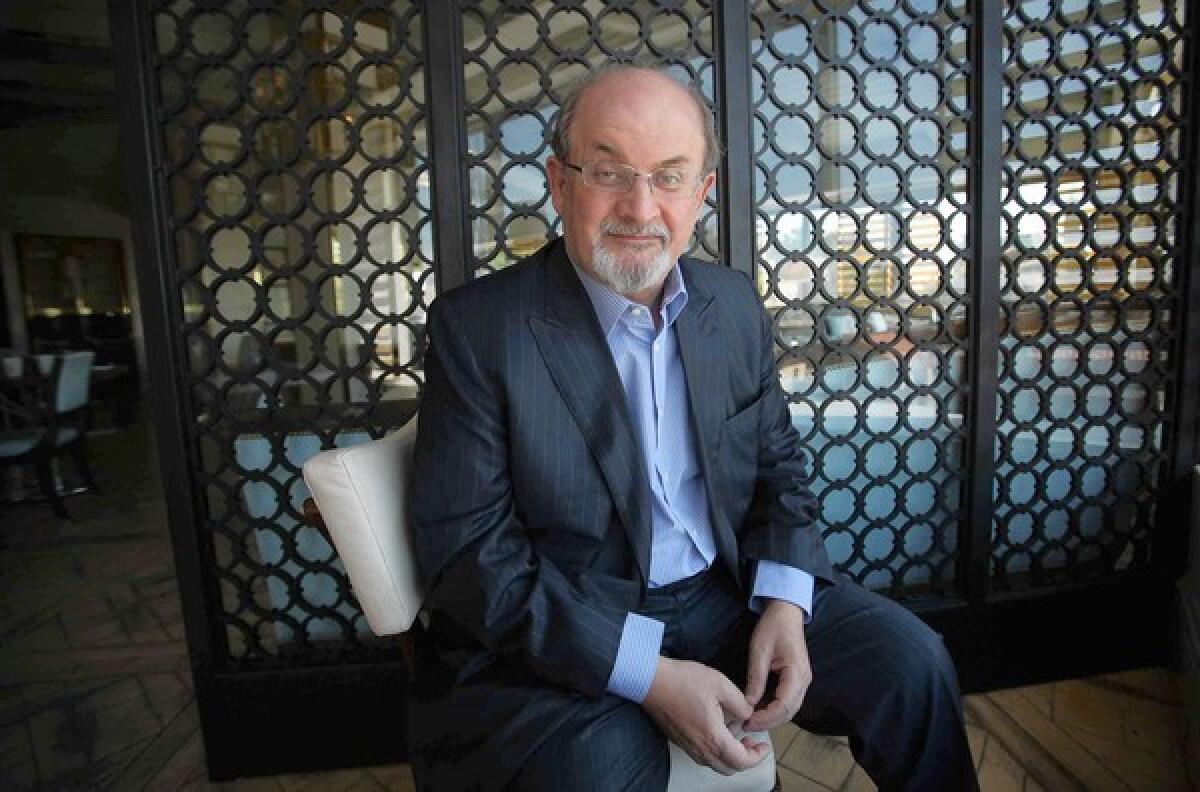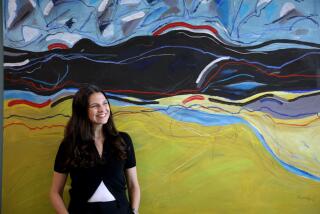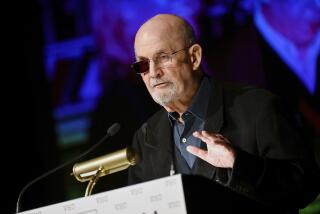Salman Rushdie, freedom writer

In the 1990s, he was the world-famous novelist few people officially laid eyes on. Of Salman Rushdie’s dozen-plus novels, it was “The Satanic Verses” (1988) that raised a hue and cry and sent him undercover: Its supposedly sacrilegious portrayal of the prophet Muhammad brought Rushdie a fatwa, a death sentence, from Iran’s Ayatollah Ruhollah Khomeini (it was lifted in 1998). The writer came to L.A. to accept the Library Foundation of Los Angeles’ literary award and to talk about his new memoir of his underground years, “Joseph Anton.” He and the book have arrived just as the blowback from “Innocence of Muslims” has caused us all to confront the questions that commandeered a decade of his life.
In the new book you write that the protagonist — you — chooses ethics and the universality of freedom over fundamentalist religion and moral relativism. Is this the defining conflict of the epoch?
I think so. I really wanted to sum it up not just in a narrow political way but in terms of what it is about literature and the things that I love that I wanted to defend against the things that were attacking them.
You called the “Innocence of Muslims” video the worst thing on YouTube. It certainly isn’t art, but it is “speech.” Should we draw a line on the protections we extend to speech?
I don’t think so. The correct response to a piece of nonsense on YouTube is to say it’s a piece of nonsense on YouTube. To use that to try to blow up the world just seems, to put it mildly, disproportionate. It’s become clear that the video has become a pretext for the unleashing of a more generalized anti-American rage. And the video has been used by political and religious leaders across the Muslim world just to point an angry mob in the direction of America.
Even as the video protests unfolded, “The Book of Mormon,” which makes light of religion, opened in Hollywood. Nobody burned down the Pantages over it.
It’s a brilliantly clever show, and I know a lot of Mormons have seen it and thought it was funny. This is how to be grown-up. We’re sometimes told that, on [history’s] calendar, Islam is only in the middle ages, so it will mature as the centuries pass. But Mormonism seems to have got there a lot faster.
You were the subject of a rather cartoonishly nasty video by Pakistani guerrillas.
When that film was brought to England, it was initially banned because it was defamatory. It was not given a certificate, and I had to go to the British Board of Film Classification and demand that it be given a certificate. I said if you’re fighting a free-speech battle, you don’t want to be defended by an act of censorship.
There are Western countries that limit free speech — for example, Holocaust-denier laws in Europe.
Even in free countries there is disagreement about these limits — I myself am against the anti-Holocaust laws, though I understand why they’re there. When a Holocaust-denying “historian” was prosecuted in Austria, it made a martyr of him, and until that moment he’d been a discredited figure. I feel the American principle, the 1st Amendment, is the best: Better to have the bad ideas out in the sunlight where they can be attacked than under the carpet where they will be in some way glamorized by being forbidden. Vampires shrivel in the sunlight.
A mature society understands that at the heart of democracy is argument. There will always be people going too far. In an open society we have to develop a thick skin and deal with it.
What’s happened in Libya — where the Libyan people have risen up against the militia that killed the American ambassador — it shows the mass of people in Libya were by no means sympathetic to what happened. We must hope for more of that.
In the book, you describe conservative Islam as looking backward at a vanishing culture and attracting followers marginalized by modern urbanization. One Muslim intellectual said “The Satanic Verses” was an attack on the Third World. Is that the larger context here?
Certainly poverty and economic decline have a lot to do with the so-called rage of Islam. You’ve got all these young men in countries which are economically in bad shape. The idea that they might be able to make a good living and get married and have a family, a decent life, seems very remote to a lot of people in a lot of the world. That makes people angry, and that rage can be channeled, and unscrupulous people are trying to channel it in ways that help them politically. The economics have a lot to do with this.
In “Joseph Anton,” you use the pseudonym (borrowed from Joseph Conrad and Anton Chekhov) you used for protection during the fatwa. What could you do in third person that you couldn’t do in first?
I tried writing it in the first person and I just didn’t like it. All this “me me me” got on my nerves. The moment I put it in the third person, I thought, oh, I can do this because I think it allows me to be objective about myself. It was easier to take one step to the side and treat myself like any other character in the book.
The book’s classified as “memoir” rather than “autobiography.” “Memoir” is sometimes criticized as literarily permissive, evidence James Frey.
The difference between memoir and autobiography, as far as I see it, is that a memoir is there primarily to tell one particular story, whereas an autobiography tries to be a full account of a life. If this were an autobiography, I might have spent a lot longer on the 41 years of my life that preceded the attack on “The Satanic Verses.” That was the story that pushed me to writing about myself because otherwise I’d never had any particular interest. I didn’t become a writer to write about myself.
You also make a distinction between “Salman” and the public figure “Rushdie.”
I wanted to suggest a slight difference between the person writing the book and the person being written about. When there were so many versions of me that other people were making up, the whole question of my identity got a bit fractured. I’m using the [journals] I kept at the time as a basis for trying to analyze and interpret those events. So in that sense it’s a literary work as well as a journal.
In your journals, did you meet a version of yourself you didn’t remember or may not even have liked at some moments?
Yes, all the time. Sometimes I was very heartened by what I found, and sometimes I thought the person writing the journal was clearly in a very bad state of mind, very depressed or very angry or just kind of unbalanced in some way. I tried to show in “Joseph Anton” all those moments I thought I disappointed myself.
You write about recapturing your freedom when you visited the U.S. from Britain during the fatwa. What was the difference between here and there?
Maybe it ties into American ideas of individualism. People were more willing to let me make my own decisions; instead of telling me that I had to be inside a particular security bubble or else, I was allowed to make those choices and it felt somehow a little more dignified. It was like being given air to breathe after being in an airless chamber for a long time. I think it’s very much the reason why I ended up making a life for myself in New York.
What are the differences between American and British Muslims?
I don’t see the kind of ghettos that develop in England and Europe, where the community gets sequestered from the country as a whole. That’s not a healthy situation. Here people are by and large much more integrated, and I think the Muslim population in this country is better educated, they’re more middle class, whereas some migrants to England came from very rural areas, places where ideas were anything but modern.
How is the Internet affecting the so-called clash of cultures?
In some ways it’s optimistic. For instance, it’s very difficult to ban books because they can be found on the Internet. Information is harder to restrict. In restricted societies, the Internet’s shown young people a better life, and it’s made them want it. You could say the Arab Spring was fired by that kind of communication. If “The Satanic Verses” [fatwa] had happened after Google, it would have been more dangerous because of the speed of transmission. The attack would have been easier to organize. The Internet is a tool. It can be put to valuable uses or misused.
David Remnick in the New Yorker used the phrase ‘’flamboyant normalcy’’ about your life now, signifying that you are both a writer and a famous writer, even to people who may never have read one of your books.
Well, you never criticize David Remnick! I just don’t feel like somebody who spends most of his time at home writing books. I occasionally go out, and every time I go out, somebody takes my picture.
You resisted anyone telling your story until you told it yourself. So what about a film version now?
I’m not thinking very hard about that. My two sons have dramatically opposite views on this. My younger son is determined that it should not be a film because he thinks it will in some way debase the book. He is rather high-minded. My older son thinks it absolutely has to be a film. I told them to fight it out and let me know.
Follow Patt Morrison on Twitter @pattmlatimes
This interview was edited and excerpted from a taped transcript. An archive of Morrison’s interviews can be found at latimes.com/pattasks.
More to Read
A cure for the common opinion
Get thought-provoking perspectives with our weekly newsletter.
You may occasionally receive promotional content from the Los Angeles Times.







